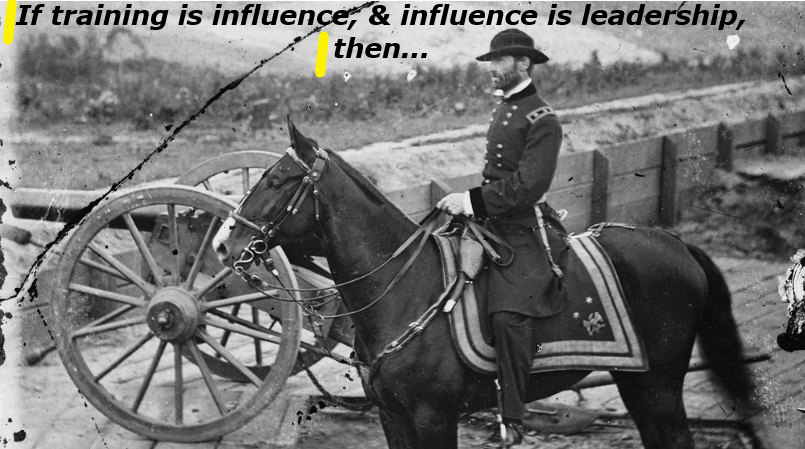“I’d follow Uncle Billy to hell”.
Union soldier under Sherman’s command
Arguably, General William T. Sherman remains one of the top 3 war commanders in American history. According to Robert L. O’Connell in his book Fierce Patriot, many historians assert that the former General of the Army’s legacy influences military operations even today.
Gen. Sherman is better known today for his famous quotes and the famed March to the Sea, but what’s often overlooked about Sherman was his seemingly innate ability to both lead and train. He empowered others by both being present and active in the training process, and approachable in all other processes.
Uncle Billy not only had strong connections up and down the chain of command but was able to leverage the bonds to bring the war to a close much sooner than later. Sherman’s capacity to lead outpaced his legend, and he took others with him through persistent development and adaptation. The famed March to the Sea was a show of influence mastery, as the campaign proved instrumental in quickly reversing the will of the Confederacy.
The General had won and maintained the kind of respect from his men that can only be fostered through the arduous and intentional work of a leader and trainer with a passion to serve. Winning that kind of respect inspires subordinates to continually strive to be better than before, and to stand confidently and repeatedly in the face of intense danger. Sherman’s victories proved that to lead at high levels, one needs to also train at high levels. Sherman’s command success also proved that to achieve superior results as a trainer, one must demonstrate an expanding capacity to lead. Why? Because the same things are required of both leaders and trainers to be successful.
Truth# 1 Both Require Personal Connection
“It’s the leader’s job to initiate a connection”
John C. Maxwell
In the training industry, making connection often get confused with “establishing credibility”. The misnomer often leads to classroom introductions that sound more like someone reading a resume. Credibility is important, but it comes more with the position (Level 1) of “trainer” than anything else. Leaders often refer to “loaning credibility” when they are assigning a position, but ultimately any position starts with a debt of credibility. The connection is how you begin to pay the credibility debt.
Relying on credibility to develop others is the same as relying on rank to get subordinates to conform and follow orders. Whether facilitating a technical class or supervising a fast-food restaurant, trust and respect must be transacted in all directions of position. The essence of trust and respect is personal connection…or relationship. If a man convinced against his will is unconvinced still, then permission must be given to both the leader and the trainer to be influenced.
Not to be mistaken for flattery and superficialities, building connections means being genuine, and again…requires intentionality. “Like” is the beginning of “trust”, and trust is another word for permission. Many leaders and trainers rely on popularity and tend to only “service” the credibility debt of position and suffer the high interest on the back end.
Truth# 2 Both Require Break Down of Pride
The making of “Uncle Billy” is not a pretty story. Precluding the glories of Civil War victories, Sherman struggled with relationships and suffered more than a tinge of bitter pride. The bondage kept the strategic mastermind from gleaning fully of his West Point training, and the multiple professional and political connections that he had at his disposal. The pride stemmed most likely from performance anxiety and actually landed him a mandatory 30-day hiatus at the beginning of the war. The ordered vacation was widely reported as him going crazy. Then, Sherman had learned to work with those who were not like him, including the men who served under him, who didn’t start off as capable military warriors. Sherman’s pride had to be broken, and in all the right ways, it was.
The humility of Sherman was displayed by him not relying on his popularity, or position as a Major General to keep the needle moving, while diligently maintaining a high degree of discipline in his rank and credibility. Trainers and managers alike often miss out on development opportunities because of too much focus on how much they are liked. It is often said that fame is more alluring than money, and the glory of vast connectedness can swell the head of an influencer. It is what sales trainer and author of New Sales Made Simple Mike Weinberg calls “overly relational”, and it is a version of pride that causes an overemphasis on what people think about you as an individual. Leaders with this type of “glory-seeking” pride display a “relationship” building focus rather than an “organization” building focus, which often leads to serial inefficiencies and high turnover.
Whatever version of pride a leader suffers from, breaking its hold will lead others to be freed from their version. Whether prideful from experience or just a pinch of self-righteousness, pridefulness is a devastating lid. It’s the leader and the champion trainer that punch through to see what’s above. It’s the servant’s heart that overcomes the weaknesses in character to produce beyond market growth and expectation (Level 3).
Sherman, through humility, set a new standard of performance for military commanders. Humble leaders and trainers get past their pride issues to conquer market challenges and overtake the competition.
Truth# 3 Both Require Positive Effect on Attitude
A trainer’s biggest reward will always be a positive effect on the attitude of others; partially because it requires an elevated attitude to elevate attitude. If one is to win influence with others, the others must have a good attitude toward the one. The good positive attitude shift is often the act of giving permission, and permission must be present to leverage for beyond expectation results. In other words, nothing really gets done until attitude gets right, but the benefits go far past permission and production.
In any culture, work or otherwise, what gets in the way of organization-wide leadership is the lack of continuous development. Attitude will either enhance or stifle what a culture produces as leaders. Attitude is the key ingredient of not just whether individuals can be trained, but also if they will help equip others in skill and character.
The level of leadership that an organization has taken on is determined by the collective attitude of the organization. In a Level 4 organization, trainers are not only respected but those whom they invest in diligently and eagerly multiply themselves through example and instruction. The essence of culture is about what is cultivated. If positive duplication is not happening, then the organization is failing to grow in leadership, and likely has little to no effective training programs.
As with good commanding officers in war, managers understand that professionals crave development and movement in character as well as skill level. Effective leaders understand that “continuous improvement” pertains to 90% of their own character and view the culture as a leadership report card.
Transformational leaders/equippers understand that legacy is less about what you leave behind, and more about where you leave OTHERS in their capacity to develop OTHERS. In order for anyone to transition from boss to leader, or from employee to loyal collaborator, the attitude must transition to higher altitudes.
In closing, the leaders we remember are the ones that transformed organizations. Pinnacle leaders replace average and status quo with new life and continuous personal growth, by being new life and continuous personal growth.
By Dustin Link






